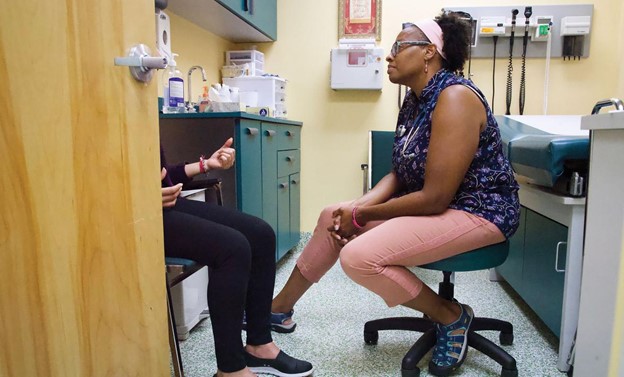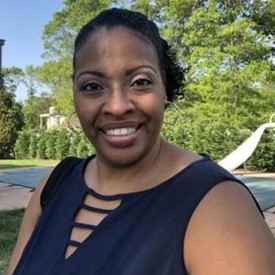Soundview Pregnancy Services (SPS) on Long Island, New York, is poised for dramatic changes with new services to assist and support women in need.
The pregnancy help medical clinic joined the Abortion Pill Rescue® Network (APRN) in January. And its Medical Manager, passionate about serving human trafficking victims, is seeking to augment Soundview’s offerings to serve in this area, as well as encourage other pregnancy help organizations (PHOs) to do so as well.
[Click here to subscribe to Pregnancy Help News!]
Shantae Rodriguez first came on board at Soundview as a volunteer before taking on her current role. Not only does Rodriguez bring a passion for women in crisis pregnancies and their children, but expertise in outreach to victims of sex trafficking. She has been an advocate and caregiver for trafficking victims and survivors in some form for over 10 years.
Rodriguez combines her Sexual Assault Forensic Examiner (SAFE) training, along with being a physician’s assistant (PA), having worked for more than a decade in an emergency department and through New Life Community Health Center, where she has served survivors of human trafficking the past four years.

Shantae Rodriguez via the American Academy of PAs
Witnessing all that she has in her various roles ignited her passion to make annual trips to Nicaragua (from 2011- 2018) and then in 2019 to Honduras with an organization that provides medical care to victims of human trafficking.
Rodriguez acknowledges that the issue is overwhelming, yet, she stated, “But once it touches you, you can never turn back.”
Though she had not worked with a pregnancy center in her experience working with victims of sex trafficking prior to joining Soundview, Rodriguez is confident that centers are encountering women in this situation, and she called for more of a connection between those who help these victims and pregnancy centers.
She indicated that Soundview is committed to making this connection.
“I want to see them (the organizations) brought into our pregnancy center,” said Rodriguez. “We have trainings scheduled in July with two anti-trafficking and sexual assault organizations.”
The most recent Charlotte Lozier Institute (CLI) report on pregnancy help centers in the U.S. found that pregnancy help outreach to victims of human trafficking is a developing area.
“Pregnancy centers are increasingly recognizing the magnitude of their role in providing help and hope to female victims of human trafficking, a form of modern-day slavery that represents a global affliction,” the CLI report said.
According to the report, “As pregnancy centers across the country are learning more about the intersection of pregnancy, trafficking and forced abortion, more are receiving formal training from law enforcement agencies and experts on the issue to implement protocols and provide critically needed resources to victims.”
It is Rodriguez’s hope that pregnancy help organizations (PHOs) will add knowledge of the crisis of human trafficking as well as become well versed in the available resources for victims if they have not already.
“If you don’t know what you’re looking for, you won’t see it,” said Rodriguez. “Staff in a majority of pregnancy centers have most likely interacted with a victim or a survivor of trafficking.”
She offered some thoughts for centers who have not yet explored the signs of human trafficking or begun offering related services.
Rodriguez said that statistically women with unplanned pregnancies are two to three times more likely to experience violence than planned pregnancies, "So you want to treat and view that trauma through a certain lens. We need to ask her, ‘What’s happened to you? How can we help you?’”
“We can’t guarantee her safety,” said Rodriguez, “but we can create safe environments. It begins with understanding the red flags of trafficking.”

via the the American Academy of PAs
“When you have a client who is coming in where they don’t control their own paperwork, perhaps do not have an I.D. or if she isn’t permitted to speak, doesn’t know where she lives—some of these are signs,” Rodriguez stated.
“These clients seem fearful to answer questions,” she added. “Our job is to make her feel safe, utilize a trauma-informed approach as we ask questions in a sensitive manner. Our standard intake questions need to include questions to determine if she is in a safe environment.”
“Victims of trafficking are not going to raise their hand and say they are being trafficked,” Rodriguez added. “You have to think about this woman and where she is at in the cycle of power/control where she is living.”
“They are in a controlling situation,” she continued. “The great thing is to find a way to get her alone. Perhaps the accompanying individual can be asked to fill out paperwork in one area—safely separate her (the client).”
“It is fraud, force or coercion causing them to feel they deserve it or that they simply cannot get out of it,” explained Rodriguez, noting there may also be mental illness or substance abuse playing into how they are controlled by someone.
“For all they know, this is what their life is going to be like and there is nothing that can be done about it,” she said. “They know the situation they’re in is not good, but they are perhaps not ready to leave it.”
Offering additional advice for pregnancy centers, Rodriguez said, “Make sure you have cards/signs in the bathroom stating, ‘If you think you’re being controlled’ or ‘Are you being threatened?’ and then list the national trafficking hotline number.”
"We have this currently in our bathroom and would suggest having this or working with your local anti-trafficking center to develop a method to screening potential victims," she said.
“The trauma informed approach is communicating to these women: I have resources, I am a resource, or I can connect you with resources that can help you with next steps,” said Rodriguez.
She recommended that if a PHO does not yet offer specific help related to human trafficking that the center plan on doing the legwork to get clients connected to the resources they need.
Trafficking victims frequently find themselves in need of the basic services provided by pregnancy help centers, and PHOs are in a unique position to offer aid to trafficking victims.
A 2014 Charlotte Lozier Institute study of victims of sex trafficking showed:
“That 55% of the women surveyed had at least one abortion, and 30% had multiple abortions during the time of trafficking. Of these more than half responded that the abortion was not their choice, and many responded by saying that the pressure from pimps to continue the trade did not allow for the time to carry a baby.”
Betty McDowell, vice president of Ministry Services for Heartbeat International, concurred that PHOs are in a prime position to assist human trafficking victims.
McDowell addressed a Senate briefing on human trafficking in the fall of 2019. Citing studies conducted by human trafficking experts Laura Lederer and Christopher Wetzel, it was noted at the briefing that 70% of trafficking survivors stated they had become pregnant while trafficked.
“With commercial sexual exploitation, predatory relationships, and sexually risky behavior at record highs in this country, we know women and girls are getting pregnant and seeking help,” McDowell said. “Women contact Option Line and come to PHOs because we provide services such as free ultrasounds in a safe and caring environment, and we can connect them with on-going support and help. That means that pregnancy resources centers (PRCs) are first responders to human trafficking.”
McDowell recognizes the need for PHOs to receive training for their staff and encourages affiliates to take advantage of Heartbeat’s resources, which include training for PHOs on human trafficking.
“Because we know trafficking victims are coming to PRCs and PHOs, we need to equip our centers to understand what human trafficking is, how to identify trafficking victims, and what to do when we identify a victim, or even when we suspect we have a potential victim,” she said. “As in other arenas and with other issues, Heartbeat works with experts to create training that is standardized, comprehensive, and on-going."
A list of human trafficking resources is available in this Pregnancy Help News report. Rodriguez’s recommended resources are available HERE. Heartbeat International has multiple resources for affiliates via the Heartbeat Services website.







